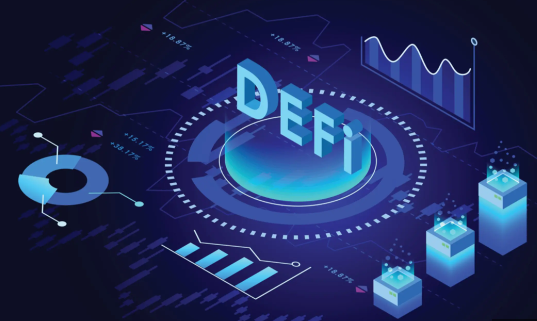DeFi, also known as Decentralized Finance, is a financial system that leverages decentralized blockchain technology to establish an accessible and transparent financial ecosystem. It aims to eliminate the control of any central authority, utilizing smart contracts to automate financial transactions like investing, borrowing, trading, and lending. This approach permits users to interact with financial applications directly, without the need for intermediaries or traditional financial institutions, which ultimately reduces costs and promotes financial inclusion.

Introduction to DeFi (Decentralized Finance)
DeFi, short for Decentralized Finance, is an innovative system that utilizes blockchain technology to create a more inclusive and transparent financial ecosystem. In contrast to traditional finance, DeFi operates on decentralized networks that enable direct peer-to-peer transactions without intermediaries such as banks. With DeFi, users have greater control over their financial assets and can engage in borderless transactions in a secure and transparent environment. DeFi offers a range of financial services, including lending, borrowing, trading, and asset management, which are executed through smart contracts on the blockchain. The potential for DeFi to transform the financial industry and provide greater accessibility to financial services to a wider population is significant.
Understanding the Basics of Decentralized Finance
Decentralized Finance (DeFi) is a novel concept that employs blockchain technology to build a decentralized and transparent financial ecosystem. DeFi systems rely on smart contracts to automate financial transactions, such as borrowing, lending, investing, and trading, which reduces the reliance on intermediaries such as brokers or banks. This results in greater accessibility to financial services, with the potential to reduce entry barriers and promote financial inclusivity, especially for those with an internet connection. Furthermore, since DeFi transactions are immutable and recorded on the blockchain, users have greater asset control, and fraud or manipulation risks are reduced. Overall, DeFi has the potential to transform the traditional financial sector, making it more efficient, inclusive, and accessible.
How DeFi Differs from Traditional Finance
There are several fundamental ways in which DeFi differs from traditional finance. Firstly, while traditional finance relies on centralized intermediaries such as banks, DeFi operates on decentralized networks, providing a more inclusive, transparent, and accessible financial ecosystem. Secondly, DeFi utilizes blockchain technology and smart contracts, which enables more efficient and secure transactions with lower transaction fees. On the other hand, traditional finance is often more costly, slower, and subject to intermediaries and regulatory bodies. Thirdly, DeFi is open-source, meaning that participation and contribution to the ecosystem are open to anyone, unlike traditional finance, which is often restricted to select individuals or groups. These distinctions position DeFi to challenge and potentially disrupt traditional finance, providing a novel way to access financial services.
Exploring the Components of DeFi Ecosystem
The DeFi ecosystem comprises various essential elements, which include decentralized exchanges (DEXs), lending and borrowing platforms, stablecoins, yield farming, and governance protocols. Decentralized exchanges enable direct cryptocurrency trading among users without intermediaries. Lending and borrowing platforms enable users to lend or borrow cryptocurrencies directly from other users, often with competitive interest rates. Stablecoins are digital assets that aim to maintain a stable value against a pegged asset, such as the US dollar. Yield farming involves earning rewards or interest by lending or staking cryptocurrencies. Governance protocols enable stakeholders to participate in decision-making processes regarding the DeFi platform’s operation and development. In summary, these components collaboratively create a decentralized and accessible financial ecosystem, emancipated from centralized control.
Key Features of DeFi Protocols
DeFi protocols possess several significant characteristics that set them apart from traditional finance. Firstly, they operate on decentralized networks, which permits direct peer-to-peer transactions without intermediaries. Secondly, they make use of blockchain technology and smart contracts, which automate transaction execution, provide transparency and security. Thirdly, DeFi protocols offer an array of financial services, such as lending, borrowing, trading, and asset management. Fourthly, they employ collateralization to secure loans, ensuring greater security for lenders. Fifthly, DeFi protocols are open-source and unrestricted, enabling anyone to participate and contribute to the ecosystem. Finally, DeFi protocols allow borderless transactions, facilitating access to financial services worldwide. These features establish DeFi protocols as a groundbreaking and inclusive means of accessing financial services.
Decentralized Exchanges (DEXs) and Liquidity Pools
Decentralized exchanges (DEXs) play a crucial role in the DeFi ecosystem by enabling direct peer-to-peer trading of cryptocurrencies without intermediaries. These exchanges are built on a decentralized blockchain network, which offers increased transparency and security compared to traditional centralized exchanges. Liquidity pools are another essential aspect of DEXs, which allow users to combine their cryptocurrencies in a pool that is utilized to execute trades automatically through smart contracts. Liquidity providers are incentivized with trading fees and tokens for their contribution to the pool. This system ensures that DEXs maintain a high level of liquidity even for less popular cryptocurrencies and offers investors an opportunity to earn a return on their holdings.
Future of Decentralized Finance and its Impact on Traditional Finance
DeFi’s future is promising, as it is expanding and developing at a rapid pace. It has the potential to challenge traditional finance’s monopoly by replacing centralized intermediaries like banks with a more accessible, efficient, and transparent financial ecosystem. With DeFi’s continued growth, it could provide a more inclusive financial system that transcends borders, promoting financial inclusion and making financial services accessible to a larger population. DeFi’s impact on traditional finance could be noteworthy, as it may compel established players to adjust and evolve their practices to compete effectively against these disruptive technologies.
Conclusion
DeFi has the capability to transform the conventional finance industry by establishing a financial ecosystem that is decentralized, transparent, and accessible. The application of blockchain technology and smart contracts has paved the way for innovative financial solutions, such as decentralized exchanges, lending and borrowing platforms, stablecoins, yield farming, and governance protocols. This approach has the potential to diminish the reliance on traditional financial intermediaries, promote financial inclusion, and decrease costs for users. Furthermore, DeFi provides users with greater autonomy over their assets, eradicating the possibility of fraud or manipulation. With the continuous growth and development of the DeFi ecosystem, it is likely to play an increasingly pivotal role in shaping the future of finance, improving efficiency, accessibility, and inclusivity.






